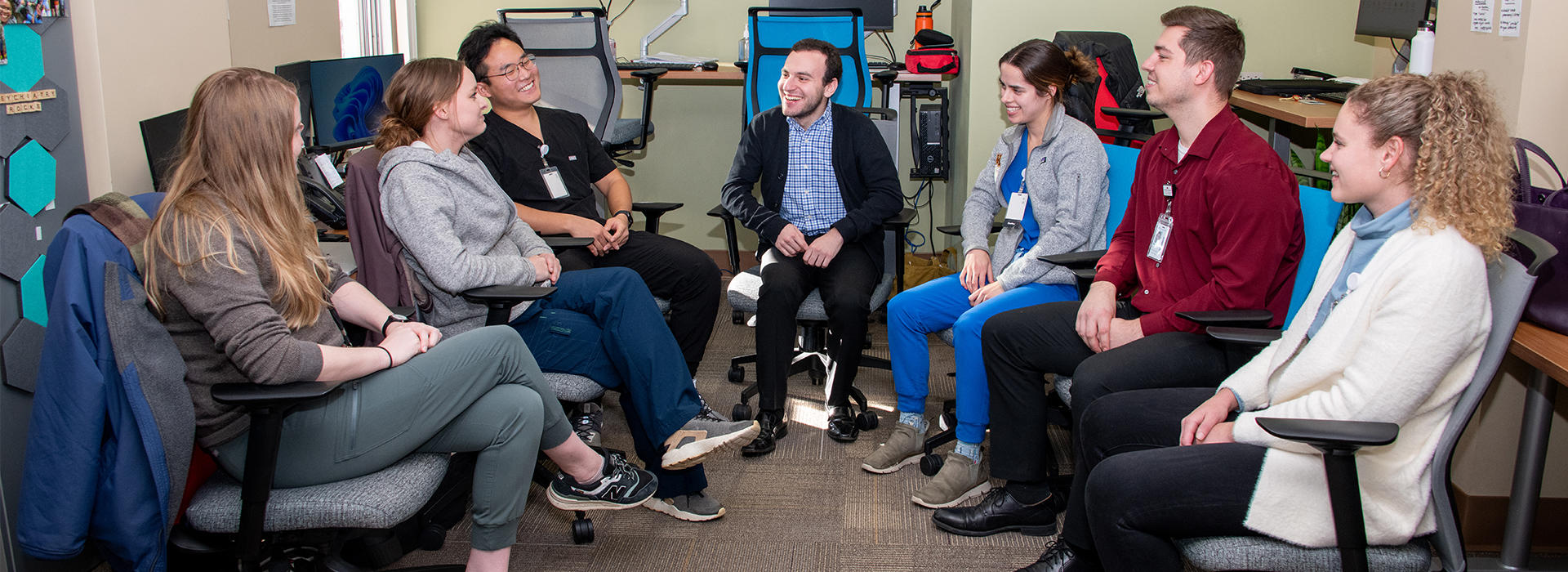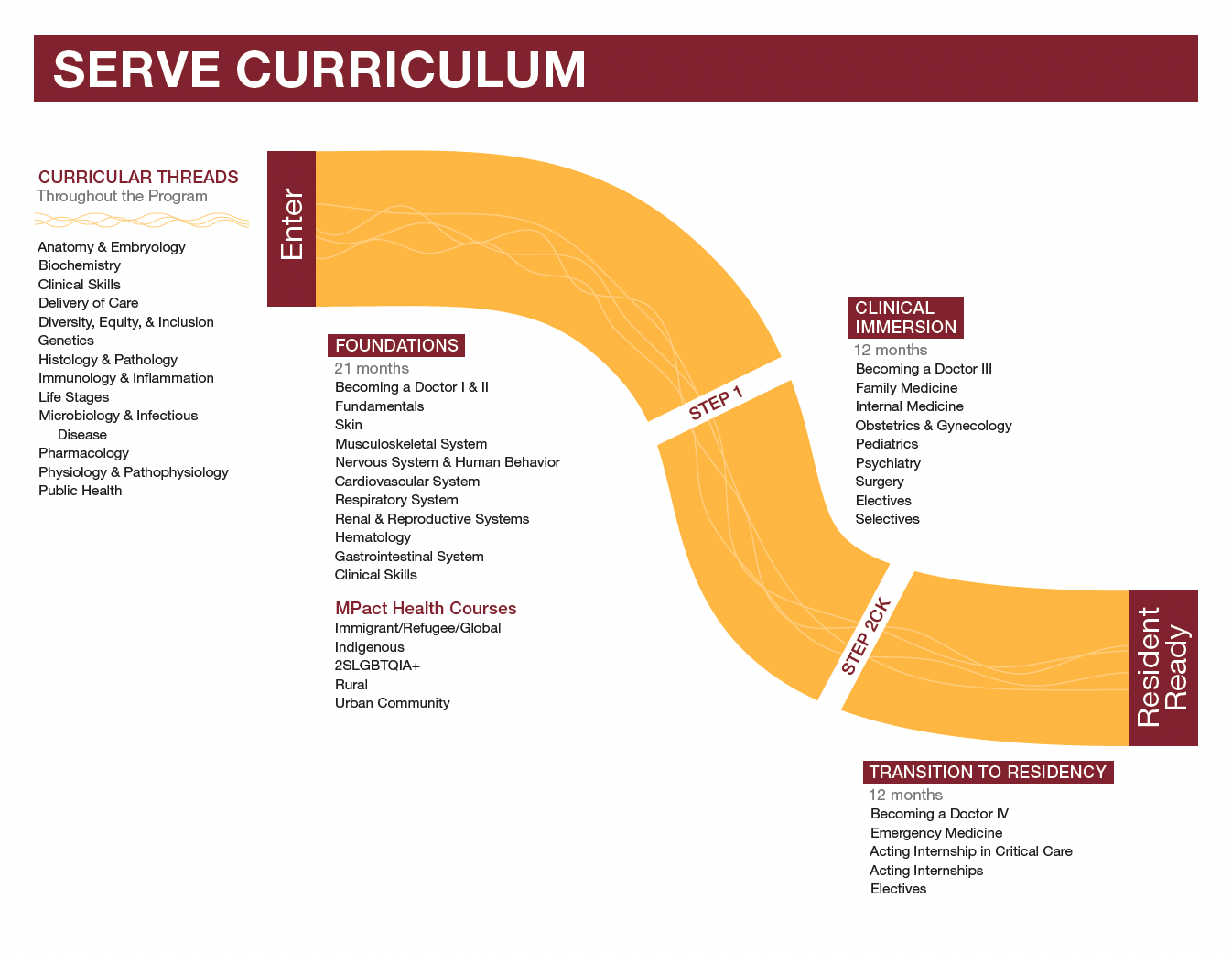
Medical Students
We are excited to present multiple educational opportunities for medical students – including for those who do not plan to go into Psychiatry. Every medical specialty brings doctors face-to-face with individuals who have mental health issues. Your success as a physician will be related to your ability to address the whole person.
Statements and Values
Antiracism Statement
The Department of Psychiatry & Behavioral Sciences condemns racism, discrimination, and oppression in all forms. We affirm that racism and oppression are public health crises with serious mental health consequences for the communities we serve.
We commit to listen to and promote Black, Indigenous and people of color. We also commit to amplify their calls for change. We have work to do. We are part of a system that has allowed racial disparities in medical outcomes to persist for far too long.
We affirm the Joint Statement on Antiracism put forth by the Association for Academic Psychiatry that condemns the long history of structural racism in our institutions. As psychiatrists and educators, we pledge to take the lead in educating ourselves and others to address these issues head-on.
Our work is guided by the following principles:
- Amplify the voices of those most directly affected by racism and oppression to restore justice. Racism and oppression are not their responsibility to solve; the responsibility to dismantle racism falls on those who have benefited from it
- Ensure a just, equitable, and inclusive educational, clinical, and research environment. Our Diversity and Inclusion Committee’s mission statement and ongoing initiatives address diversity in all forms as the path to excellence in each of our mission areas
- Take all needed steps to identify and dismantle unjust and inequitable systems, as individuals and collectively. This includes systems of white supremacy, a political or socioeconomic system in which white people benefit from a structural advantage (privilege) over other ethnic groups, on both a collective and individual level, and other forms of oppression and discrimination within our medical school, our university, and society at large.
In line with these departmental principles, the UMN Psychiatry and Behavioral Sciences Education Council commits to the following actions:
- Lead and engage in national conversations on racial justice and the dismantlement of systems of white supremacy in Psychiatry and Behavioral Sciences based on what we have learned by listening to Black, Indigenous, and people of color in Minnesota following the killing of George Floyd as a result of police brutality by former members of the Minneapolis Police Department. Additionally, we will author and post a statement naming George Floyd and summarizing these perspectives.
- Affirm and broadcast our anti-racism statement and action steps on our websites, social media accounts, and other internal and external communications
- Implement the curriculum developed by the American Psychiatric Association Black Caucus, entitled, “Stress and Trauma Toolkit: for Treating Historically Marginalized Populations in a Changing Political and Social Environment” in Departmental graduate medical education programs
- Engage in proactive outreach, support, and mentorship of Black, Indigenous, and people of color, including current trainees, matched trainees and applicants engaged in the recruitment process
- Use the lens of diversity as a driving factor during recruitment and applicant ranking activities, utilizing best practices as outlined by the Department’s Diversity and Inclusion Committee.
Medical Student Phases
Foundations Phase
In your first 21 months of Medical School, you will take “Nervous System & Human Behavior,” a course that introduces you to the psychiatry fundamentals that every physician should know. You will also prepare to transition to your clinical education, including your work with patients with behavioral health needs in Fundamentals, Clinical Skills, and Becoming a Doctor I and II.

Clinical Immersion/Required Clerkship
Psychiatry Externship ADPY 7500 is a requirement for medical students to complete in their third or fourth year of medical school. This course focuses on acute presentations of major psychiatric illnesses, and prepares medical students to recognize, diagnose, and understand treatment for these illnesses.
Specialty Selection
We offer a range of elective opportunities for University of Minnesota medical students and qualified visiting medical students. Individually arrange d electives that meet students’ interests and educational needs are also available.
Visiting Students
Visiting Domestic Students
We encourage medical students from other LCME-accredited institutions to consider participating in an elective at the University of Minnesota. Students can apply through VSLO. If you are considering visiting our campus as a medical student, please review the application process for visiting students.
Deadlines: Visiting student applications are reviewed on a term-by-term basis. Because of internal deadlines, we strive to notify students with a decision 6-8 weeks prior to the elective start date. If you are selected for a spot, you will be extended an offer through VSLO.
Psychiatry Electives available to visiting students include:
Visiting International Students
Because of the large number of foreign medical student applicants to the University of Minnesota Medical School, they have found it necessary to restrict registration of students to those applying from institutions with which we have affiliation agreements. Please see the visiting international student website for more information.
Shadow and Observing in the UMMC-Fairview System
You are a current U of M Medical Student
If you are a current U of M medical student in good standing, you can email and find a faculty/resident to observe/shadow. You have already done the primary Fairview onboarding as part of Medical School, so you’re all good to go. You are allowed to observe/shadow for up to a total of 24 clinical hours.
When you have dates/times lined up with someone, please email the details to psychmed@umn.edu.
If you are having trouble finding a preceptor to work with or have any questions, please email psychmed@umn.edu.
You are not a U of M Medical Student
If you are not a current U of M medical student, you will have a few steps to complete:
- You’ll need to find a person to shadow/observe and the specific dates/times you will be there. You can find someone by emailing faculty/residents. If you are having trouble finding a preceptor to work with, please email psychmed@umn.edu for ideas of where to start.
- When you have specific dates/times lined up with someone, please email the details to psychmed@umn.edu.
- The coordinator will email you a form to fill out.
- You will need to onboard through a platform called Clinician Nexus.
- Finally, you’ll be all set to shadow/observe.
Please contact psychmed@umn.edu with any questions about this process!
Research Opportunities
U of M Medical Students and undergraduate students interested in psychiatry-related research are encouraged to reach out to the Principal Investigator (or their lab) directly and arrange research opportunities. If you’re not sure who you want to work with or need help getting in contact, reach out to psychmed@umn.edu.
Psychiatry Interested Medical Students
The Psychiatry Student Interest Group (PsychSIGN) is led by an active group of medical students who organize informative and engaging events for medical students. Please see the Psychiatry Interest Group page for more information.
